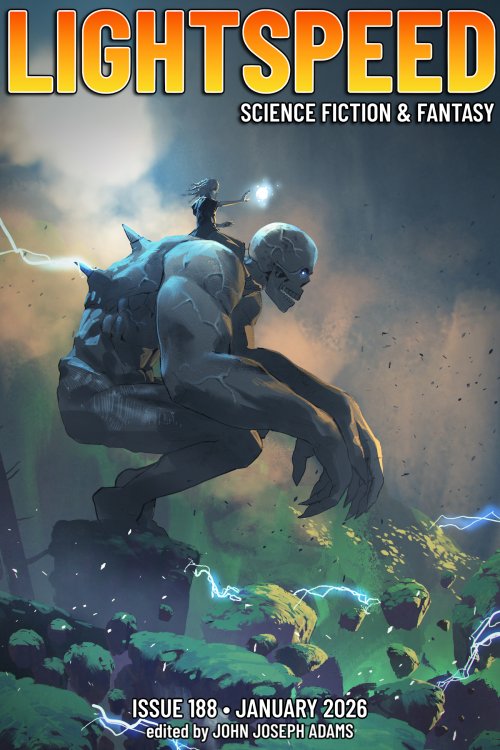Please see our important Publisher’s Note following this month’s Editorial that has important information about a new threat to the survival of all SF/F/H magazines.
Jill wiped xylem from her gloves and closed her car’s leafy hood. She’d kept Snapdragon on the road for almost twenty years, and if the world would leave her alone, she could keep him alive for five more, easy.
It wouldn’t, and she couldn’t. No amount of repairs today would spare Snapdragon from the weeding, or her from the pain of uprooting a thing she loved.
She’d do what needed doing. Somehow.
She set down her toolbox, rubbed Snapdragon’s flower-petal roof, and let him trundle the ten feet from her backyard to the communal pasture. He nestled in alongside the other cars, oblivious to the way his boxy patchwork body stood out against the other cars’ sleek single-plant designs. Snapdragon extended his quickroots and wrapped them around the fertilizer spigot like the rest.
The cars looked all alike in the dimming light. Sunset above, but its colors weren’t what they used to be. Some things’ time had come and gone, like the crimson and orange of a polluted sky.
A sledgehammer and a box of car-grade targetpoison sat on her back porch. She picked up a beer instead. Time enough for another drink for them both, in the warm fleeting evening of September in Oregon.
Maudlin. She wasn’t going to die anytime soon. Never give up, and do what needs doing, no matter how many people give up on you.
Old Xavier waved to her from a garden across the pasture. Jill took a swig of beer, the bottle blocking her face. Her boys would’ve been horrified to see her ignore their so-called “grandpa,” but they’d find reasons to yell at her no matter what she did. This wasn’t the kind of day when she could handle conversation with other people.
Snapdragon’s time was up, no matter how well she’d kept him. Forty years of biotech had done their job. Atmospheric carbon was at its lowest level in three hundred years. The climate models said: time to shift from reduction to stabilization. Every year, ten percent of the old high-capture cars had to come off the roads.
Snapdragon was a ’79, from the era when they made cars you could repair with some biotools and know-how. Jill had replaced every part she could name. A new transmission after a hundred and fifty thousand miles. New chairs after the mess with her younger son’s boyfriend. She’d even managed a new computer, because the company was kind enough to release their seed code when they went out of business.
Modern cars were a single plant rather than a symbiotic collective. They self-repaired, or you mulched them and got a new one.
Her phone chirped on the porch railing with the woodwind ringtone she’d set for family.
They could be calling for nothing. Banalities, arguments, the usual. Or they could be calling to comfort her. The car retirement lottery was public.
The phone fell quiet after the eighth ring. Jill swirled her half-empty bottle and took another sip.
Xavier cleared his throat. “Evening.”
He’d crossed the pasture, and leaned on his walker at the border of her backyard. Hell. If he couldn’t move any further, it was her problem, and she’d do what needed doing. She called out, “How’s your walker? Are my grafts holding up?”
Xavier took that as permission to enter her garden. Once he was halfway across, he said, “Better than ever. Nobody grows ‘em like you.” The walker’s oaksteel feet were grafted to springy roots, gripping wheels that kept him level over the uneven ground.
She smiled ruefully. “You con artist. What’s got you sweet-talking your way onto my property?”
Xavier stopped at her porch step. “Heard Snapdragon’s number came up in the lottery.”
Jill shrugged. “Had to happen eventually. At this point, all the volunteers already did.”
“They give you a replacement, don’t they?”
“I guess. Don’t trust anything you can’t maintain yourself.” She wagged her empty bottle at him. “Want a beer?”
“Oh no, I only ever ask for one favor per trip. Can’t push my luck, at my age.”
Jill raised her eyebrows and let him ask.
He said, “Can you come by tomorrow and move some boxes?”
Jill scraped a thumbnail against the beer bottle’s embossed logo. “Don’t tell me you’re moving out. Those group homes—”
“Hey, you fight that out with my grand-niece.” Xavier gave a lopsided smile. “She’s coming to stay for a few weeks, and I need some help cleaning out the guest room.” He pointed his chin at another neighbor’s house. “Adem’s coming over, but it’ll go faster with two strong backs.”
“Of course. But if you do move out of here, I won’t stop my boys from chasing you down.”
He tapped his walker against the porch rails, in front of the targetpoison box. “You want me to take care of Snapdragon? I know how much you loved him. Go for a walk on Sunday, and I’ll have a mulch receipt for you. You can borrow my car while you pick out a new one.”
“Nah. It’s my problem.”
He nodded. “If you say so.”
Jill took a deep breath. Pure sweet Portland air, with the lingering crispness before the clouds set in for autumn. The first stars glittered into view above. More than her childhood nights had ever held. Clean skies, and a city where every streetlamp and building focused their lights down only where they were needed.
“Sunday might be a good day for a walk,” she said. “Tell Adem to come over tomorrow at eight, all right? We’ll do what needs doing.”
She’d miss Snapdragon. There was real satisfaction in the work of hands and brain, in taking your own problems apart and solving them. But some things in this world were bigger than a woman alone.
Enjoyed this story? Consider supporting us via one of the following methods:







